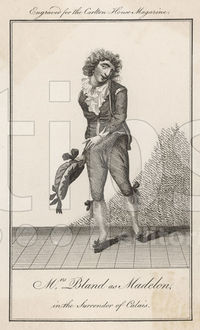Annotation:Lira Lira La
X:1 T:Lira Lira La M:C| L:1/8 R:Air Q:"Moderato" B:Aird – Selection of Scotch, English, Irish and Foreign Airs, vol. 4 (1796, No. 186, p. 70) Z:AK/Fiddler’s Companion K:D A2d2d3d|(cd)(ec) d4|(ef)(ge) (dc)(BA)|A2 d>e d2 z2| A2d2d3d|(cd)(ec) d4|(ef)(ge) (dc)(BA)|A2 d>e d2z2| f3f (fe) e2|(ed)(cd) A4|f2f2 (fe) e2|(ed)(cd) !fermata!A4| ABcA d4|cdec d4|(ef)(ge) (dc)(BA)|A2 (de) d2z2||
LIRA LIRA LA. English, Air (cut time). D Major. Standard tuning (fiddle). One part. The song appears in George Coleman the younger's opera The Surrender of Calais, music by Samuel Arnold, performed at the Little Theatre, Haymarket, London, on 30 July, 1791. "Lira Lira" is sung by the character Mandelon (famously performed by 'Mrs. Bland', Maria Theresa Bland, nee Romanzini, an Italian-Jewish actress/singer from age 4; in the travesti role), and begins:

Little thinks the townsman's wife,
While at home she tarries;
What must be the lass's life,
Who a soldier marries.
Now with weary marching spent,
Dancing now before the tent,
Lira, lira, lira, lira, lira la,
With her jolly soldier.
The melody also appears in several late 18th/early 19th century publications, such as James Aird's Selection, vol. 4 (Glasgow, 1796), Thomas Preston's Entire New and Compleat Instructions for the Fife (London, 1796), G. Astor's The Hoboy Preceptor, or Military Pieces (London, 1800), and Thomas Ball's The Gentleman's Amusement Book 2 (Norfolk, Va.).

